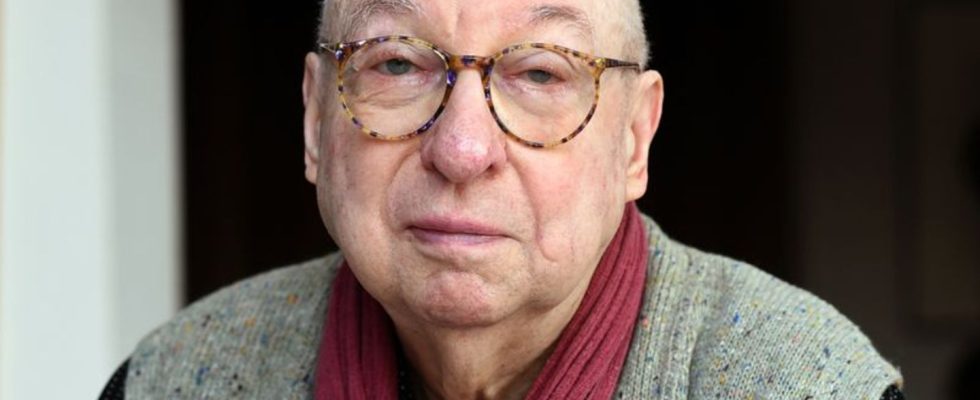Music
Loner of world renown – composer Aribert Reimann is dead
Composer Aribert Reimann has died at the age of 88. photo
© Jens Kalaene/dpa-Zentralbild/dpa
At the age of ten he was composing songs, at the age of twenty he accompanied Dietrich Fischer-Dieskau on the piano, and at the age of thirty he wrote his first opera. Now the composer Aribert Reimann has died at the age of 88.
It was one of his countless awards and it was particularly fitting for him: In 2016, the Academy of Sciences and Literature dedicated the Robert Schumann Prize for Poetry and Music to the composer Aribert Reimann. In doing so, she honored an exceptional musical talent who was particularly dedicated to the human voice and the harmony of language and music. Reimann died on Wednesday in Berlin at the age of 88.
Go your own way
The Berlin native was undisputedly considered one of the most important and most performed contemporary composers – and yet he was also an outsider. Throughout his life he resisted the “compulsion of the avant-garde” and developed a special musical language, expressive and expressive, beyond trends and zeitgeist.
“I’ve always tried to go my own way and find my own style,” he told the German Press Agency on his 80th birthday. “You have to stay true to yourself.” The jury of the renowned Ernst von Siemens Music Prize named him in 2011 Award for his life’s work to the “undisputed master of vocal music”.
His numerous recent awards include the German theater prize Der Faust (2018) and, just this year, the Gema Music Authors Prize, both for life’s work. He accepted the last award personally in February.
More than seventy musical works
The artist’s son, who was born in 1936, was influenced by his love of singing from an early age. After the war, his father was director of the Berlin State and Cathedral Choir, and his mother was a professor of solo singing. When the ten-year-old first took on the boy’s role in Bertolt Brecht’s opera “The Yes Man” at Berlin’s Hebbel Theater, his decision was sealed. “I knew I’d come back at some point. I just didn’t know how yet.”
More than seventy musical works were created as a result – song cycles, instrumental pieces, orchestral works and nine operas. His most recent musical theater work “L’Invisible” was based on three plays by Maurice Maeterlinck and premiered at the Deutsche Oper Berlin in 2017.
He celebrated his greatest success with the opera “Lear”, which premiered in Munich in 1978 and was written specifically for the singer Dietrich Fischer-Dieskau (1925-2012). There have now been more than 25 new productions worldwide.
“Wake people up a little bit”
The setting of the refugee drama “Medea” based on the play of the same name by Franz Grillparzer, the female counterpart to Shakespeare’s royal drama, was also celebrated as a great moment in the opera world. The magazine “Opernwelt” named the commissioned work for the Vienna State Opera the best premiere of 2010.
The composer wrote his own texts, the libretti, early on. “I want to shake people up a little,” says Reimann. “Even with older material, a reference to time is always important to me. They still have to concern us today.”
Call against war and for survival
Looking back, the opera “Troades” based on a drama by Euripides was particularly important to him, a call against war and for survival. In view of the refugee crisis and the current upheavals worldwide, it takes on particular significance. He himself grew up with bombing raids during the war, lost his brother as an eight-year-old and experienced the “Night of Potsdam” in 1945.
In addition to his work as a composer, Reimann was also successful as a piano accompanist for decades. “Build it up. You can’t make a living from composing for the first 20 years,” his mother advised him early on. His most important long-term partners were the baritone Fischer-Dieskau and the mezzo-soprano Brigitte Fassbaender (84).
“Looking forward, into the unknown”
He gave up his day job in the 90s because of the workload. Until his retirement he remained a professor of contemporary song – first in Hamburg and then in Berlin. Singers like Claudia Barainsky (58), Christine Schäfer (58) and Stella Doufexis (1968-2015) come from his classes.
Even in old age, Reimann worked in the tower room of his apartment in the Schmargendorf district of Berlin. He once said that he knew people of his generation who only lived in the past. “I think that’s terrible. I have to look forward, into the unknown.”

